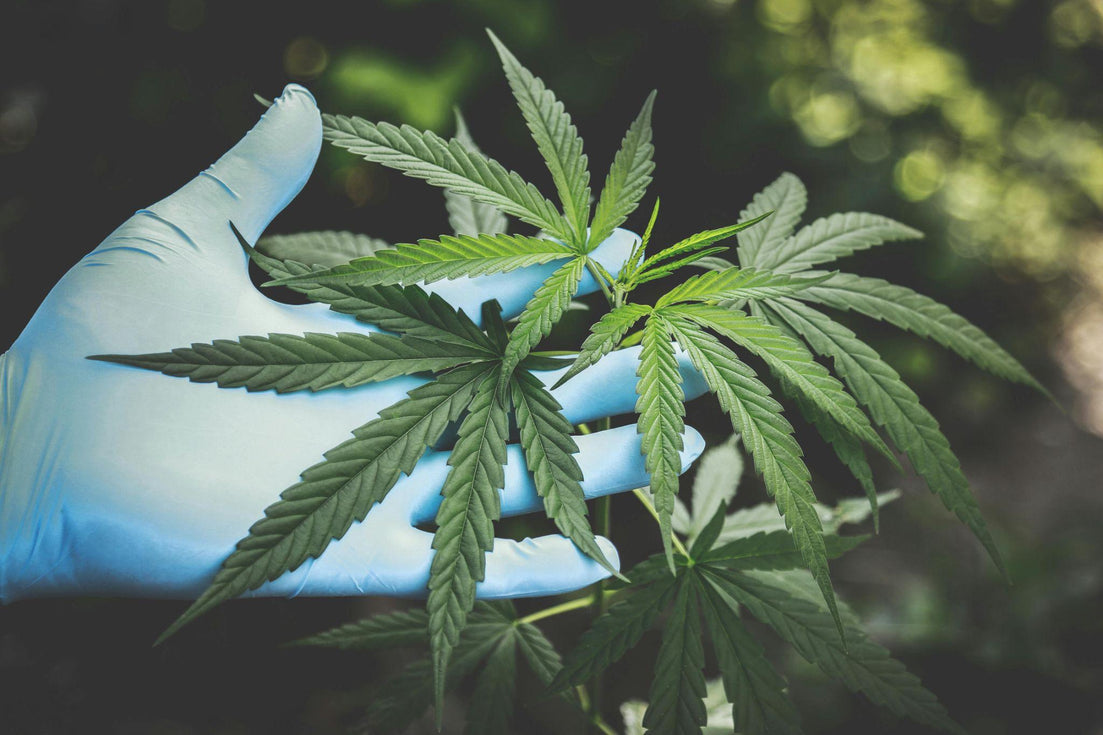Your cart is currently empty.

CBD and CBG are two of the most popular compounds found in hemp plants. Though both compounds offer potential health benefits, they have distinct uses and effects on the body. Understanding these differences is essential for anyone looking to use CBD or CBG products as part of their natural wellness routine. In this blog post, we'll explore cbd vs cbg - what sets them apart from each other, common uses for both compounds, how they interact with our bodies and more. We’ll also discuss some key health benefits associated with using either compound individually or together.
Table of Contents:
- What is CBD and CBG?
- Differences between CBD and CBG:
- Does Full Spectrum CBD Have CBG in it?
- Can You Take CBD and CBG Together?
- Common Uses for CBD vs CBG
- Common Uses for CBD:
- Health Benefits of CBG vs CBD
- Health Benefits of Taking CBD:
- Health Benefits of Taking CBG:
- FAQs in Relation to Cbd vs Cbg
- Is CBG more effective than CBD?
- What are the negative effects of CBG?
- Is CBG the mother of all cannabinoids?
- Does CBG feel the same as CBD?
- Conclusion
What is CBD and CBG?
Cannabinoids are chemical compounds that interact with our bodies’ endocannabinoid system, providing a range of potential health benefits. CBD (cannabidiol) is one of the most widely studied cannabinoids due to its therapeutic properties, while CBG (cannabigerol) is a lesser-known cannabinoid that has recently gained attention for its potential medical uses.
CBD, a non-psychoactive compound found in hemp or marijuana plants, interacts with our body's endocannabinoid system to provide relief from various symptoms such as pain, anxiety, inflammation and insomnia. CBG, another non-psychoactive cannabinoid akin to CBD, is thought to possess potential therapeutic benefits such as anti-inflammatory and analgesic effects.
Differences between CBD and CBG:
The main difference between these two cannabinoids lies in their molecular structure; while both contain carbon atoms arranged into rings called cyclohexane structures – making them similar on paper – they differ slightly when it comes to how those rings connect together. Specifically, CBD has three connected rings whereas CBG only has two connected rings; this slight difference can affect how each molecule binds with receptors within the human body which could account for some differences in their respective therapeutic effects.
CBD and CBG, both compounds of the cannabis plant, have distinct effects on the body. As we explore further, let's take a look at what full spectrum CBD is and if it contains CBG.
Key Takeaway: Two major cannabinoids present in hemp, CBD and CBG, possess slightly distinct molecular makeups. CBD is widely studied for its therapeutic properties while CBG has recently gained attention for potential medical uses; both compounds interact with our bodies' endocannabinoid system to provide relief from symptoms such as pain and inflammation.
Does Full Spectrum CBD Have CBG in it?
Full spectrum CBD is a type of cannabidiol extract that encompasses all the cannabinoids, including CBD, CBG, CBC and THC. Full spectrum CBD contains not only cannabidiol, but also other compounds like CBG, CBC and THC. While full spectrum CBD does contain some amount of CBG, it is usually present in very small amounts compared to other cannabinoids like CBD or THC.
What makes full spectrum CBD unique from other forms of cannabidiol extract is its ability to provide users with an “entourage effect” – which means that the various compounds work together synergistically to produce greater effects than they would if taken alone. The synergistic nature of full spectrum CBD, which allows for a greater effect than if the compounds were taken alone, can be especially advantageous for those struggling with conditions like chronic pain or anxiety.
The benefits of taking full spectrum CBD with CBG are numerous. CBG has been demonstrated to possess anti-inflammatory qualities which could potentially reduce inflammation throughout the body and help alleviate signs associated with chronic pain or arthritis. Additionally, research suggests that CBG may have neuroprotective effects on the brain by helping protect neurons from damage caused by oxidative stress – making it a potentially useful treatment option for neurological disorders such as Parkinson’s disease or Alzheimer’s disease.
The potential for a combined, synergistic effect of utilizing both CBD and CBG in tandem could lead to amplified therapeutic benefits compared to either compound on its own; however, more research is needed before any definitive assertions can be made regarding these interactions. Keywords: Synergy, Therapeutic Benefits, Interactions, Research
Full Spectrum CBD may contain CBG, however it is important to understand the potential benefits and risks of taking both together before combining them. Therefore, let's explore if it is safe to take CBD and CBG together and what dosage should be taken for optimal results.
Key Takeaway: Full spectrum CBD, with its array of compounds including CBG and THC, is purported to offer a synergistic 'entourage effect' due to the combined action of these cannabinoids. The combination of these cannabinoids may provide greater therapeutic benefits than either compound alone, though further study is needed to establish this.
Can You Take CBD and CBG Together?
It is safe to take both CBD and CBG together, as long as the recommended dosage is followed. Taking a combination of these two compounds can provide several potential benefits, including increased relaxation and improved sleep quality. For those looking for natural alternatives to manage symptoms such as pain, anxiety, or insomnia, taking CBD and CBG together may be an effective option.
When taking both compounds at once it is important to follow the recommended dosage guidelines set by your healthcare provider or manufacturer. For an individual, the amount of each compound should be adjusted accordingly; yet a sensible beginning point could be 10-20 mg daily for CBD and 2-4 mg every day for CBG. For optimal safety, consulting with a healthcare professional before beginning any supplement regimen is highly recommended.
Taking CBD and CBG together has been shown to provide numerous health benefits due to their combined therapeutic properties. By combining CBD and CBG, individuals may find relief from physical pain associated with chronic conditions like arthritis or fibromyalgia, while also reducing inflammation throughout the body. Additionally, this dynamic duo has been linked with improved mood regulation which could potentially help ease symptoms associated with depression or anxiety disorders. Finally, many users report better quality sleep after taking a combination of these two compounds; making them great options for anyone struggling with insomnia related issues such as difficulty falling asleep or staying asleep through the night without waking up frequently during their rest cycle.
Overall, it is important to understand the differences between CBD and CBG before taking both together. Additionally, understanding common uses for each can help inform decisions about which one may be best suited for individual needs. Let's delve further and compare the typical applications of CBD and CBG.
Key Takeaway: Taking CBD and CBG together can be a powerful combination to provide relief from physical pain, reduce inflammation, improve mood regulation and sleep quality. It is essential to consult with a physician prior to commencing any new supplementation plan, and also adhere to the suggested dosing directions for both compounds in order to maximize their effects.
Common Uses for CBD vs CBG
Common Uses for CBD:
Cannabidiol (CBD) is one of the most popular natural remedies on the market today. CBD has been employed to help with a range of symptoms, including aches, uneasiness, sadness, sleeping difficulties and inflammation. It can also be used as an anti-inflammatory agent and to improve overall wellbeing. Some people have even found relief from chronic conditions such as arthritis with CBD use.
CBG, similar to CBD, has been suggested as a possible treatment for inflammation and pain relief associated with certain medical conditions; it may also have neuroprotective qualities that could reduce anxiety levels and improve moods. CBG has been noted for its potential to lessen inflammation and alleviate pain related to certain medical issues. Research suggests that CBG may be able to offer neuroprotection and potentially ameliorate anxiety levels and uplift moods in those experiencing mental health issues or distress disorders.
Whereas CBD may be more suitable for physical ailments, CBG appears to have potential calming effects on the brain's neural pathways which could make it beneficial in treating psychological issues such as depression or anxiety. Despite the potential of CBG and CBD to treat different ailments, further research is necessary in order to confirm their respective efficacy.
CBD and CBG have multiple uses, with a broad range of potential benefits. Continuing our exploration of the potential benefits, let's now consider how each compound may contribute to improved health and wellness.
Health Benefits of CBG vs CBD
Both have been studied for their potential health benefits, but they differ in terms of chemical structure, effects on the body, and common uses. CBG, which may be helpful in treating inflammation and skin conditions such as acne, has different effects on the body than CBD, which is known for its analgesic properties, stress relief benefits and sleep regulation.
Health Benefits of Taking CBD:
Cannabidiol (CBD) is a non-psychoactive compound found in hemp plants that has been linked to a variety of therapeutic benefits. CBD has been found to potentially alleviate inflammation, decrease stress levels and promote better moods, act as an analgesic for chronic pain relief, and protect cells from oxidative damage associated with various diseases. CBD may also offer neuroprotective properties, which could potentially help guard against certain neurological disorders like Parkinson's and Alzheimer's.
Health Benefits of Taking CBG:
Cannabigerol (CBG) is another cannabinoid found in cannabis plants with similar properties to CBD but slightly different effects on the body. CBG has been linked to reducing inflammation and acting as an antibacterial agent, potentially offering relief from skin conditions like acne or eczema. Additionally, research shows that CBG may provide relief from gastrointestinal issues such as nausea or vomiting due to its antispasmodic effects on smooth muscle tissue within the digestive tract walls. It also appears to possess antidepressant qualities which could help regulate moods naturally without any psychoactive side effects associated with THC consumption
Key Takeaway: CBD and CBG are two of the most popular compounds in cannabis plants that offer different benefits. CBD has demonstrated potential to reduce inflammation, improve moods, and act as an antioxidant; while CBG may offer neuroprotection against neurological disorders such as Parkinson's or Alzheimer's disease and antispasmodic effects on smooth muscle tissue in the digestive tract with no psychoactive side effects. Additionally, it can also provide relief from gastrointestinal issues due to its antispasmodic effects on smooth muscle tissue within the digestive tract walls along with antidepressant properties without any psychoactive side effects associated with THC consumption.
FAQs in Relation to Cbd vs Cbg
Is CBG more effective than CBD?
Two of the most commonly encountered cannabinoids in cannabis are CBG and CBD, both of which may have therapeutic effects such as easing pain, anxiety, and sleeplessness; however, it is yet to be determined if CBG has a greater efficacy than CBD for symptom relief. Both compounds may have therapeutic potential, including alleviating pain, nervousness and sleeplessness. However, research has not yet conclusively determined whether CBG is more effective than CBD for managing symptoms. While some studies suggest that CBG may be more potent than CBD at treating certain conditions like inflammation or glaucoma, further research is needed to make a definitive conclusion about its efficacy compared to other cannabinoids like CBD.
What are the negative effects of CBG?
CBD (cannabidiol) and CBG (cannabigerol) are both cannabinoids found in the cannabis plant. CBD is more widely known than CBG due to its widespread availability, but they have some similar effects on the body. Both can be used for managing symptoms such as pain, anxiety, and insomnia; however there are some differences between them. CBD has been studied more extensively than CBG so far, with fewer reported side effects overall. Though CBG has not yet been reported to cause significant adverse effects when taken alone, it may interact adversely with certain medications and increase sedative-like properties if combined with other substances such as alcohol or opioids.
Is CBG the mother of all cannabinoids?
No, CBG is not the mother of all cannabinoids. CBD and CBG are both compounds found in cannabis plants, however they have different chemical structures and interact with the body differently. Although research on CBG is still in its infancy, it has the potential to be just as beneficial when used together with CBD. It's thought that CBD and CBG may work together synergistically to create an effect known as "the entourage effect". This means that their effects may be greater than either one alone.
Does CBG feel the same as CBD?
Both cannabinoids, CBD and CBG, have similar properties such as being non-psychoactive, anti-inflammatory, analgesic, anticonvulsant and anxiolytic in nature. However, there are some distinctions between them that may affect how they interact with the body. CBD is more widely known for its therapeutic effects than CBG because it has been studied extensively over the years; however, recent research suggests that CBG may offer many of the same benefits as CBD but with fewer side effects due to its unique chemical structure. In terms of how they feel when consumed orally or topically applied to the skin - both provide a calming sensation but not necessarily an identical one since their individual chemical structures can cause different reactions in users depending on their body chemistry.
Conclusion
In summary, CBD and CBG are two distinct cannabinoids present in cannabis that have comparable yet distinctive impacts on the body. Both offer potential health benefits for a variety of conditions, but it is important to understand their differences when deciding which one may be best suited for your needs. While full spectrum CBD does contain trace amounts of CBG, they can also be taken together as long as you do so under medical supervision or with guidance from an experienced healthcare professional. Ultimately, understanding how these two compounds interact with your body will help you make an informed decision about whether taking both CBD and CBG is right for you.
Discover the difference between CBD and CBG to find the right solution for your needs. Take advantage of our expert advice today to learn more about these two powerful compounds.



